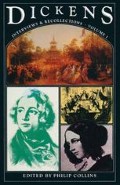Abstract
[His daughter Mamie writes:] He had a wonderful attraction for children and a quick perception of their character and disposition; a most winning and easy way with them, full of fun, but also of a graver sympathy with their many small troubles and perplexities, which made them recognise a friend in him at once. I have often seen mere babies, who would look at no other stranger present, put out their tiny arms to him with unbounded confidence, or place a small hand in his and trot away with him, quite proud and contented at having found such a companion; and although with his own children he had sometimes a sterner manner than he had with others, there was not one of them who feared to go to him for help and advice, knowing well that there was no trouble too trivial to claim his attention, and that in him they would always find unvarying justice and love.1
Access this chapter
Tax calculation will be finalised at checkout
Purchases are for personal use only
Preview
Unable to display preview. Download preview PDF.
Notes
Mary (Mamie) Dickens, ‘My Father at Home’, Cornhill Magazine, n. s. iv (1885) 33.
Ragged School Union Quarterly Record, July 1877, repr. in Dkn, LVI (196o) 185–6. Mr Whitmore was doubtless a veracious man, but he slips up in some of the details of his anecdote. Probably the article he mentions was ‘Anybody’s Child’ (by W. B. Jerrold), Household Words 4 Feb 1854, describing the plight of London’s uncared-for children. Alfred Dickens gives another instance of his father’s helping such ‘ragged’ children: he befriended a local crossing-sweeper boy, sent him to a Ragged School at night, and paid for his emigrating to Australia — ‘but one of the many hundreds of similar actions which this warm-hearted man performed… of which the world knew nothing’ — ‘My Father and His Friends’,.Sash’s Magazine, w (1911) 628. See also Philip Collins, ‘Dickens and the Ragged Schools’, Dkn, Lv (1959) 94–109; and Norris Pope, Dickem and Charity (1978).
Lord Redesdale, Memories (1915) 1,65–6. Dickens wrote a superbly amusing account of this (or some similar) day on the river in a letter of it July 1851 (N,11, 325–7). For Redesdale’s memories of Dickens a few days before his death, see below, II, 350–1.
M. F. Armstrong [neé Morgan], ‘Our Letter’, Saint.Nicholas: Scribner’s Illustrated Magazine for Girls and Boys, IV (1877) 438–41. For Dickens’s letter of thanks, to Feb 1862, see N, III, 286. On Dickens and the Morgan family, see essays by W.J. Carlton, Dkn, LIII (1957) 75–82, and LIV (1958) 88–93. The Colchester performance which they attended took place on 1 November 1861.
William Milligan, ‘How I met Charles Dickens’, Dkn, mutt (1922) 211–15. Dickens later wrote to him again, from Gad’s Hill. For further particulars of this encounter, see Dkn VII (191 1) 249–50.
Kate Douglas Wiggin, A Child’s journey with Charles Dickens (Boston and New York, 1912) pp. 20–32.
Mary Angela Dickens, ‘My Grandfather as I Knew Him’, Nash’s Magazine, v (1911) 101–10. She also wrote ‘A Child’s Recollections of Gad’s Hill’, Strand Magazine, XIII (1897) 69–74, where she specifies that it was over Tiny Tim that Dickens wept (and ‘I had never before seen a grown-up person cry’). She also remarks, ‘I have no recollection of ever being told that my grandfather was a great man. There is no shadow in my memory of ever having feared him. But all my recollection is pervaded with the sense that “Venerables” - as I was taught to call him -was not as other men.’ And, though she did not fear Dickens, ‘a vague sense of dread’ was associated with his absences, so that when he was writing in the chalet, she used to creep in from the garden, no longer feeling at ease playing there.
Author information
Consortia
Editor information
Copyright information
© 1981 Palgrave Macmillan, a division of Macmillan Publishers Limited
About this chapter
Cite this chapter
Wiggin, K.D., Others. (1981). Charming with Children, Usually. In: Collins, P. (eds) Dickens. Interviews and Recollections. Palgrave Macmillan, London. https://doi.org/10.1007/978-1-349-04591-4_39
Download citation
DOI: https://doi.org/10.1007/978-1-349-04591-4_39
Publisher Name: Palgrave Macmillan, London
Print ISBN: 978-1-349-04593-8
Online ISBN: 978-1-349-04591-4
eBook Packages: Palgrave Literature & Performing Arts CollectionLiterature, Cultural and Media Studies (R0)

